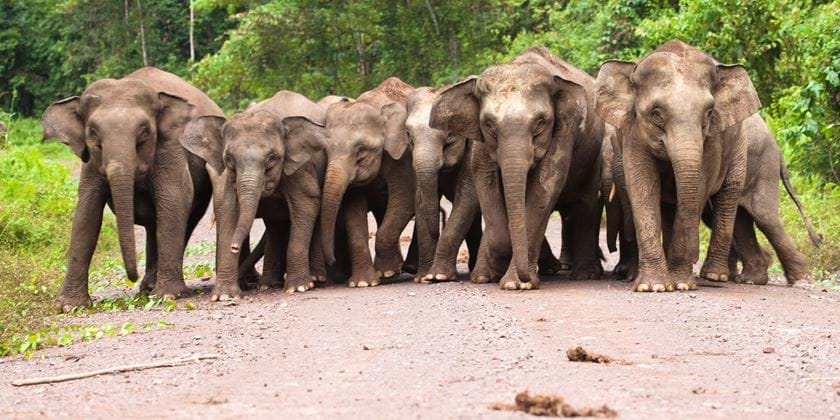British Asian Trust secures £600K grant to support coexistence of people and elephants in Northeast India
To promote co-existence between humans and elephants in the Northeast region of India over a three-year period, the British Asian Trust has secured a £585,619 grant from the Darwin Initiative, expanding its footprint in biodiversity conservation in South Asia.
The grant will see the British Asian Trust work to reduce conflict between humans and elephants and protect biodiversity by building awareness about elephants among communities who encounter them and improving their livelihood and income opportunities.
India’s Northeast region, part of the Indo-Burma biodiversity hotspot, is home to over 20%(1) of Asia’s wild elephants. Loss of habitat and encroachment into forest areas mean elephants and people often come into contact and conflict as they compete for the same space.
With the support of the Darwin Initiative grant, the British Asian Trust, and local partner Aaranyak, will take a community-centred approach to address human-elephant conflict in seven high incidence districts of Assam and Meghalaya, where in the last six years, there have been over 90 human deaths and 60 elephant deaths(2).
Based on the British Asian Trust’s and Aaranyak’s extensive experience in addressing human-elephant conflict, and aligned with International Union for Conservation of Nature’s (IUCN) Human-Wildlife Taskforce Conflict Mitigation Guidelines, the project will:
- Raise awareness and educate communities about elephants and conflict to better support coexistence, and train villagers to install solar-powered electric fencing to protect crops without harming elephants, securing livelihoods as well.
- Identify additional livelihood opportunities and skill villagers to generate additional or increased income and reduce poverty, with women making up 80% of the total target.
- Share knowledge and build capacity among local communities, other Indian organisations, IUCN’s Asian Elephant Specialist Group and local governments through workshops and publications.
British Asian Trust Executive Director – India, Saleem Khan, said, “Elephants are a keystone species crucial to the survival of wider ecosystems. Our experience has shown that aware and sensitised communities become more positive towards elephants, actively promote coexistence, and promote biodiversity. This grant from the Darwin Initiative will help address the urgent need to mitigate human-elephant conflict by focussing both on the requirements of low-income communities and the wildlife that live alongside them, and in the long-term help conserve the biodiversity of the region.”
The British Asian Trust will provide £100,000 in match funding for this programme, raised from its network of global supporters.
By the end of the third year of the project, the British Asian Trust and Aaranyak aim to achieve the following outcomes:
- Community engagement and empowerment: 75%(3) reduction in human deaths and serious injury across 600 households.
- Livelihoods promotion: 30%(3) increase in annual household income across 600 households.
- Biodiversity protection: 40%(3) reduction in elephant killings in target areas and 20% increase in sightings or signs of other key species.
The Darwin Initiative is a UK Government grants scheme for biodiversity conservation and poverty reduction.
References
(1) CHOUDHURY, ANWARUDDIN. (2004). Human–Elephant Conflicts in Northeast India. Human Dimensions of Wildlife. 9. 261-270. 10.1080/10871200490505693.
(2) Data on human and elephant deaths in target geographies has been collected by Aaranyak from various sources, including Forest Department, news clippings and social media posts.
(3) According to data in target geographies has been collected by Aaranyak from various sources:
In the last 6 years, there have been over 90 human deaths in the target districts
Average Annual Income per household is INR 35,000 according to Aaranyak data from west Assam
Over 16 elephants died between 2018-2021 in the target districts in Assam

